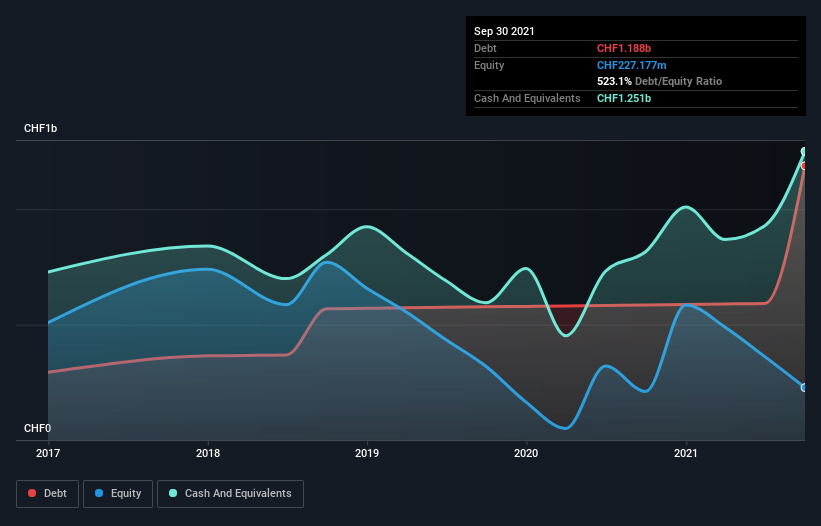
Legendary fund manager Li Lu (who Charlie Munger backed) once said, 'The biggest investment risk is not the volatility of prices, but whether you will suffer a permanent loss of capital.' When we think about how risky a company is, we always like to look at its use of debt, since debt overload can lead to ruin. As with many other companies Idorsia Ltd (VTX:IDIA) makes use of debt. But is this debt a concern to shareholders?
When Is Debt Dangerous?
Debt and other liabilities become risky for a business when it cannot easily fulfill those obligations, either with free cash flow or by raising capital at an attractive price. Part and parcel of capitalism is the process of 'creative destruction' where failed businesses are mercilessly liquidated by their bankers. However, a more common (but still painful) scenario is that it has to raise new equity capital at a low price, thus permanently diluting shareholders. Having said that, the most common situation is where a company manages its debt reasonably well - and to its own advantage. The first step when considering a company's debt levels is to consider its cash and debt together.
See our latest analysis for Idorsia
What Is Idorsia's Net Debt?
The image below, which you can click on for greater detail, shows that at September 2021 Idorsia had debt of CHF1.19b, up from CHF585.2m in one year. However, its balance sheet shows it holds CHF1.25b in cash, so it actually has CHF62.3m net cash.

How Strong Is Idorsia's Balance Sheet?
According to the last reported balance sheet, Idorsia had liabilities of CHF129.6m due within 12 months, and liabilities of CHF1.32b due beyond 12 months. On the other hand, it had cash of CHF1.25b and CHF3.40m worth of receivables due within a year. So its liabilities total CHF196.9m more than the combination of its cash and short-term receivables.
Since publicly traded Idorsia shares are worth a total of CHF2.83b, it seems unlikely that this level of liabilities would be a major threat. Having said that, it's clear that we should continue to monitor its balance sheet, lest it change for the worse. Despite its noteworthy liabilities, Idorsia boasts net cash, so it's fair to say it does not have a heavy debt load! When analysing debt levels, the balance sheet is the obvious place to start. But it is future earnings, more than anything, that will determine Idorsia's ability to maintain a healthy balance sheet going forward. So if you want to see what the professionals think, you might find this free report on analyst profit forecasts to be interesting.
Over 12 months, Idorsia made a loss at the EBIT level, and saw its revenue drop to CHF36m, which is a fall of 48%. That makes us nervous, to say the least.
So How Risky Is Idorsia?
By their very nature companies that are losing money are more risky than those with a long history of profitability. And the fact is that over the last twelve months Idorsia lost money at the earnings before interest and tax (EBIT) line. Indeed, in that time it burnt through CHF542m of cash and made a loss of CHF520m. Given it only has net cash of CHF62.3m, the company may need to raise more capital if it doesn't reach break-even soon. Summing up, we're a little skeptical of this one, as it seems fairly risky in the absence of free cashflow. The balance sheet is clearly the area to focus on when you are analysing debt. But ultimately, every company can contain risks that exist outside of the balance sheet. For example, we've discovered 3 warning signs for Idorsia that you should be aware of before investing here.
At the end of the day, it's often better to focus on companies that are free from net debt. You can access our special list of such companies (all with a track record of profit growth). It's free.
New: AI Stock Screener & Alerts
Our new AI Stock Screener scans the market every day to uncover opportunities.
• Dividend Powerhouses (3%+ Yield)
• Undervalued Small Caps with Insider Buying
• High growth Tech and AI Companies
Or build your own from over 50 metrics.
Have feedback on this article? Concerned about the content? Get in touch with us directly. Alternatively, email editorial-team (at) simplywallst.com.
This article by Simply Wall St is general in nature. We provide commentary based on historical data and analyst forecasts only using an unbiased methodology and our articles are not intended to be financial advice. It does not constitute a recommendation to buy or sell any stock, and does not take account of your objectives, or your financial situation. We aim to bring you long-term focused analysis driven by fundamental data. Note that our analysis may not factor in the latest price-sensitive company announcements or qualitative material. Simply Wall St has no position in any stocks mentioned.
About SWX:IDIA
Idorsia
A biopharmaceutical company, engages in the discovery, development, and commercialization of drugs for unmet medical needs in Switzerland.
Moderate and slightly overvalued.

